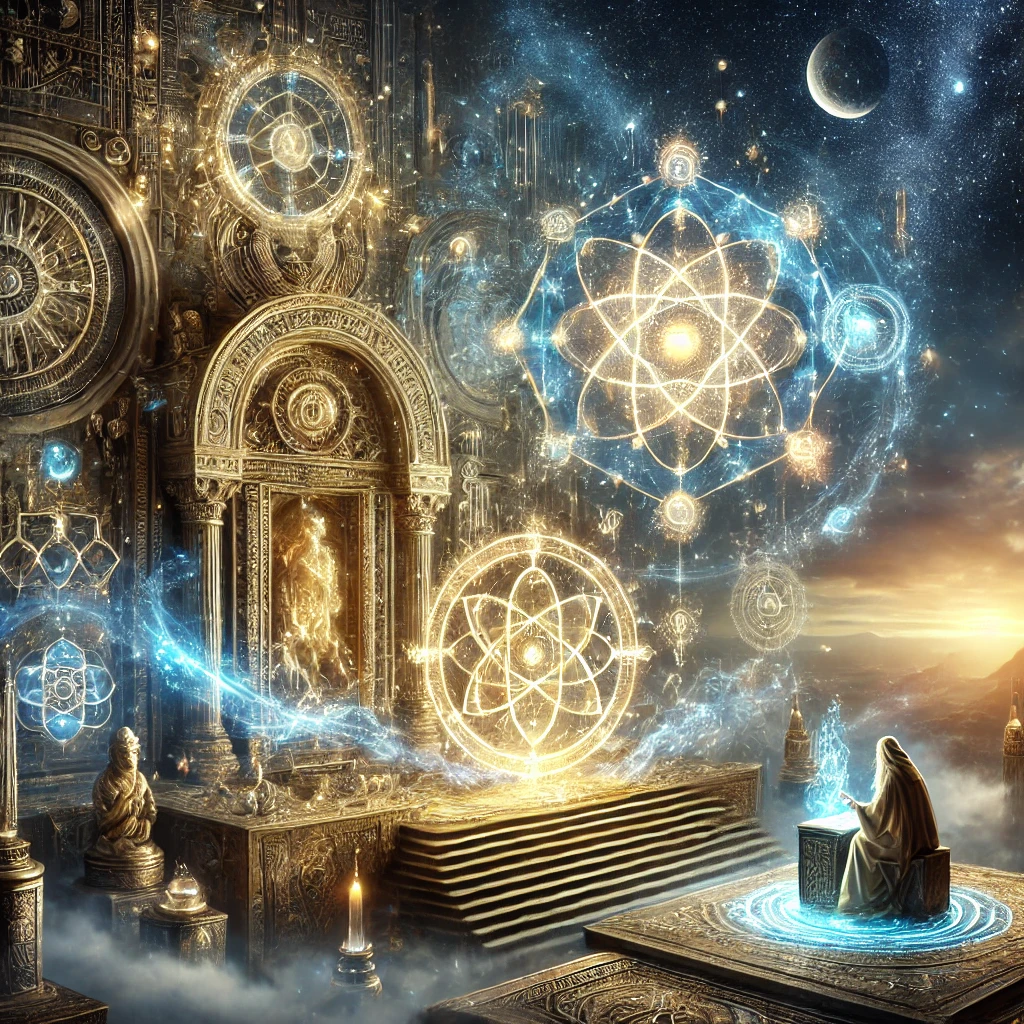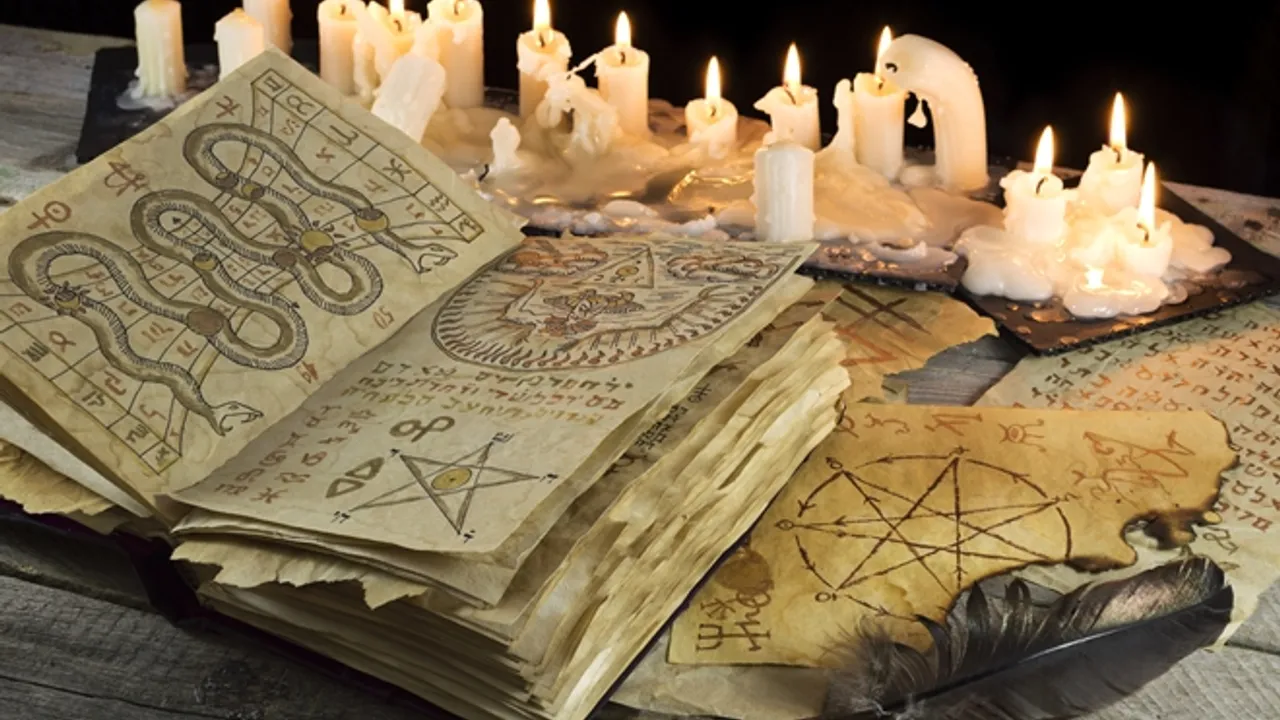Harnessing the fundamental forces of the universe and communicating with otherworldly realms has been one of humanity’s greatest aspirations throughout history. The intriguing connection between science and magic has profoundly influenced human evolution and the pursuit of knowledge. Are you ready to explore how ancient beliefs intersect with the truths revealed by science?
Magic and Witchcraft: The Enigmatic Subject of Human History
Crystal balls foretell the future, wands possess extraordinary powers, and mysterious symbols influence the laws of nature. Ancient tomes summoning powers from other realms are among history’s most fascinating topics. Magic and witchcraft have often been banned by state laws and deemed a societal danger. But what are these concepts forbidden in religious texts? Are they manifestations of metaphysical power, or could they represent ancient technologies yet to be fully understood?
The 19th and 20th Centuries: The Golden Age of Magic and Charlatanism
The late 19th and early 20th centuries marked a peak in the cultural fascination with magic and charlatanism. The Industrial Revolution brought newfound wealth to the upper classes, sparking an interest in Eastern mysticism. The secrets of India, the forbidden sciences of the Middle East, and the enigmatic texts of Egypt captivated audiences in Europe and America. Even influential business figures lined up to consult seers claiming to predict the future.
Aleister Crowley and His Mysterious Journey
One of the most notable figures of this movement was Aleister Crowley. Born into a wealthy and devout family, Crowley studied theology at Cambridge University. Disillusioned by the Christian faith’s roots in older beliefs, he abandoned religion to pursue magic, joining the Hermetic Order of the Golden Dawn. Crowley’s travels took him around the world, eventually leading him to Egypt, where he encountered a woman claiming to be a priestess of Isis. She imparted to him the “Book of the Law,” a text on the secrets of magical science, reportedly delivered through telepathic means.
The Philosophy of Thelema and Its Social Impact
Over the years, Crowley immersed himself in the philosophy of Thelema, revealing the mysteries of the supernatural to his followers. Many began to view him as a prophet. However, some communities under his influence engaged in controversial practices, including drug-fueled rituals and sexual experimentation. These actions exemplify why magic and witchcraft have been banned in many societies.

The Role of Magic in Ancient Cultures
In numerous ancient civilizations, magic held significant importance. In Egypt, practitioners served as doctors, priests, and educators, mastering the art of manipulating the universe’s fundamental forces. Known as “heka,” magic was seen as the secret of creation. The gods themselves were believed to have used magic to form humanity. Heka was a force influencing all aspects of existence.
Sumerians and the Meaning of Magic
The Sumerians referred to magic in their cuneiform tablets, using terms like “Magi Mei,” meaning “people of knowledge.” For them, magic was a power that maintained cosmic order. According to Sumerian belief, this knowledge was taught to humans by the Anunnaki, who shared the universal laws of nature.
Modern Interpretations of Magic
Today, the term “magic” often carries negative connotations, yet its historical essence is far deeper. Magic represents the quest to master the fundamental building blocks of the universe, a pursuit that seeks harmony in both the physical and spiritual realms. Practices like meditation and energy work strengthen our connection with nature.
Energy Manipulation and Healing
When fully embraced, the results of energy manipulation can be astonishing. In 1978, Dr. Laurence, a PBS documentary producer, met John Chang, a traditional healer in Indonesia, skilled in the art of Qigong. Using techniques such as touch or acupuncture, Chang transferred raw energy accumulated through meditation to treat patients. A documentary captured him using this energy to ignite newspaper. Despite the skepticism of experts, his abilities defied measurement by scientific instruments, as he claimed the energy differed fundamentally from electricity.
The Ethical Use of Energy
Can this universal energy be used for malicious purposes? The answer lies in understanding the duality of creation: just as light and darkness coexist, energy can serve both good and evil. Ancient myths recount how gods endowed humans with the ability to manipulate this energy, highlighting its potential for positive and negative applications.
Magic and Religion
Monotheistic religions often portray magic and witchcraft as the work of malevolent forces. This perspective has ingrained a negative image of these practices in societal consciousness. While some use this knowledge for self-serving purposes, its true essence lies in harnessing universal energy for enlightenment and healing.
Magic Through the Ages
Throughout history, individuals have employed magical techniques to achieve goals ranging from conflict resolution to harm. Rituals involving blood, symbols, and incantations were common. For example, Babylonian King Hammurabi included laws addressing witchcraft in his code, reflecting its societal impact.
Conclusion: The Timeless Allure of Magic
The history of magic and witchcraft reveals humanity’s evolving understanding of universal energy. As in the past, our perception of this enigmatic force continues to shape its place in modern society. Far from being solely linked to darkness, magic offers a means to explore human potential and the mysteries of existence.
Science and Magic: A Journey of Discovery
The beliefs and practices of the ancient world offer a fascinating window into humanity’s quest to understand and harness the forces of the universe. As we examine the intricate connections between science and magic, we uncover a shared pursuit: the desire to comprehend existence and manipulate the unseen energies that shape our world.
Interplay of Science and Magic in Ancient Beliefs
In ancient civilizations, the boundaries between science and magic were often blurred. Alchemy, for instance, was not merely a precursor to chemistry but also a spiritual quest to uncover the essence of life. Scholars sought the “Philosopher’s Stone,” a mythical substance believed to grant immortality and transmute base metals into gold. Yet, this pursuit was as much about spiritual enlightenment as material gain.
Similarly, ancient astronomers were also astrologers. They meticulously studied the heavens, charting celestial movements to predict eclipses and seasonal changes. At the same time, they sought to divine human destiny and the will of the gods through the stars. These practices reflect a holistic worldview where the physical and metaphysical realms were deeply interconnected.
The Scientific Revolution and the Decline of Magic
The Scientific Revolution of the 16th and 17th centuries marked a turning point in humanity’s understanding of the natural world. Thinkers like Galileo, Newton, and Kepler introduced a framework of empirical observation and mathematical precision that challenged mystical explanations. The shift from a geocentric to a heliocentric model of the solar system epitomized this paradigm change, relegating astrology to the realm of superstition.
Despite this, the allure of magic persisted. The 19th century saw a revival of interest in the occult, driven by romanticism and a longing for the mysteries that science seemed to strip away. Organizations like the Hermetic Order of the Golden Dawn sought to reconcile ancient magical traditions with contemporary intellectual currents, blending rituals with philosophy.
The Legacy of Magic in Modern Science
While science has largely superseded magic as the dominant means of understanding the world, the legacy of ancient practices remains embedded in modern thought. Concepts such as energy manipulation and holistic healing, once dismissed as mystical, are now explored within the frameworks of quantum mechanics and integrative medicine.
Meditative practices rooted in Eastern philosophies, such as mindfulness and yoga, are scientifically recognized for their benefits in stress reduction and mental health. Similarly, the placebo effect—a phenomenon where belief in treatment leads to real physiological changes—echoes the idea that intention and perception can shape reality.
Reimagining Magic in a Scientific Age
In contemporary culture, magic often serves as a metaphor for untapped potential and the unknown. From the fictional wizardry of Harry Potter to the spiritual teachings of modern mystics, magic invites us to explore the limits of human imagination and possibility. It reminds us that not all phenomena can be immediately measured or understood and that wonder and curiosity remain central to human experience.
Conclusion Bridging Ancient and Modern Wisdom
The relationship between science and magic is not one of opposition but evolution. Both are born of the same human impulse: to seek meaning, mastery, and connection with the cosmos. By examining this interplay, we gain insight into the enduring questions that drive humanity and the ever-changing ways we strive to answer them.
Magic, in its essence, may not be the manipulation of supernatural forces but the recognition of the extraordinary within the ordinary—a perspective that science, at its best, continues to inspire.
